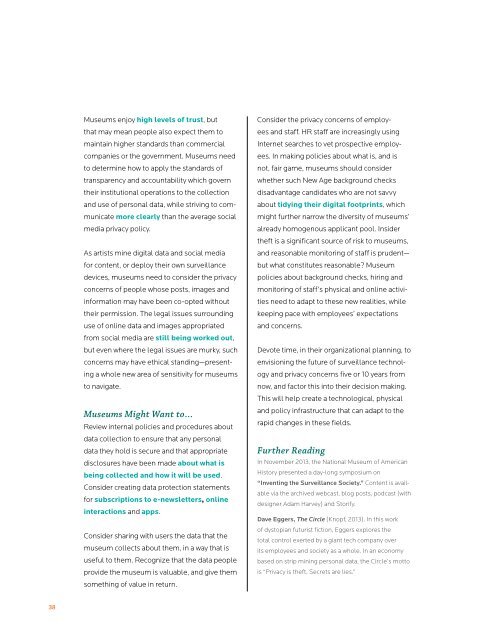1kLPuWX
1kLPuWX
1kLPuWX
You also want an ePaper? Increase the reach of your titles
YUMPU automatically turns print PDFs into web optimized ePapers that Google loves.
Museums enjoy high levels of trust, but<br />
that may mean people also expect them to<br />
maintain higher standards than commercial<br />
companies or the government. Museums need<br />
to determine how to apply the standards of<br />
transparency and accountability which govern<br />
their institutional operations to the collection<br />
and use of personal data, while striving to communicate<br />
more clearly than the average social<br />
media privacy policy.<br />
As artists mine digital data and social media<br />
for content, or deploy their own surveillance<br />
devices, museums need to consider the privacy<br />
concerns of people whose posts, images and<br />
information may have been co-opted without<br />
their permission. The legal issues surrounding<br />
use of online data and images appropriated<br />
from social media are still being worked out,<br />
but even where the legal issues are murky, such<br />
concerns may have ethical standing—presenting<br />
a whole new area of sensitivity for museums<br />
to navigate.<br />
Museums Might Want to…<br />
Review internal policies and procedures about<br />
data collection to ensure that any personal<br />
data they hold is secure and that appropriate<br />
disclosures have been made about what is<br />
being collected and how it will be used.<br />
Consider creating data protection statements<br />
for subscriptions to e-newsletters, online<br />
interactions and apps.<br />
Consider sharing with users the data that the<br />
museum collects about them, in a way that is<br />
useful to them. Recognize that the data people<br />
provide the museum is valuable, and give them<br />
something of value in return.<br />
Consider the privacy concerns of employees<br />
and staff. HR staff are increasingly using<br />
Internet searches to vet prospective employees.<br />
In making policies about what is, and is<br />
not, fair game, museums should consider<br />
whether such New Age background checks<br />
disadvantage candidates who are not savvy<br />
about tidying their digital footprints, which<br />
might further narrow the diversity of museums’<br />
already homogenous applicant pool. Insider<br />
theft is a significant source of risk to museums,<br />
and reasonable monitoring of staff is prudent—<br />
but what constitutes reasonable? Museum<br />
policies about background checks, hiring and<br />
monitoring of staff’s physical and online activities<br />
need to adapt to these new realities, while<br />
keeping pace with employees’ expectations<br />
and concerns.<br />
Devote time, in their organizational planning, to<br />
envisioning the future of surveillance technology<br />
and privacy concerns five or 10 years from<br />
now, and factor this into their decision making.<br />
This will help create a technological, physical<br />
and policy infrastructure that can adapt to the<br />
rapid changes in these fields.<br />
Further Reading<br />
In November 2013, the National Museum of American<br />
History presented a day-long symposium on<br />
“Inventing the Surveillance Society.” Content is available<br />
via the archived webcast, blog posts, podcast (with<br />
designer Adam Harvey) and Storify.<br />
Dave Eggers, The Circle (Knopf, 2013). In this work<br />
of dystopian futurist fiction, Eggers explores the<br />
total control exerted by a giant tech company over<br />
its employees and society as a whole. In an economy<br />
based on strip mining personal data, the Circle’s motto<br />
is “Privacy is theft, Secrets are lies.”<br />
38


